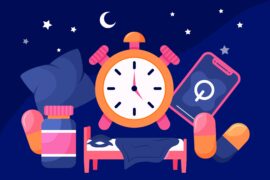Basically, sleep deprivation refers to not getting enough sleep and it happens to most people at one point or another during their life. Sometimes, it is caused by circumstances like the one outlined above: a new baby, for instance. Other times, sleep deprivation is caused by a sleep disorder like insomnia or sleep apnea.
Regardless of the cause, sleep deprivation is marked by extended periods of time of being unable to get adequate sleep. Sometimes, people push themselves to the limit professionally or academically and deliberately avoid getting enough sleep. Those individuals are just as prone to the negative side effects of sleep deprivation as those who unwittingly experience it. Humans are unable to keep sleep deprivation up endlessly; they eventually will doze off. However, sleep deprivation has been shown to cause death in laboratory animals.
Effects of sleep deprivation
Sleep deprivation can have some very serious effects on your health and well being. It not only affects you physically, but it has an enormous impact on your mental functioning as well. New parents can attest to the major side effects that occur due to sleep deprivation, since new babies typically disrupt their regular sleep schedule and can cause issues with lack of sleep. If you’ve ever experienced a bout of sleep deprivation, then you know how unpleasant it can be. Even the simplest days become major ordeals to get through; your temper gets out of control and every little thing sets you off — doing even basic things like the dishes can seem insurmountable. There’s no doubt about it: sleep deprivation is bad news. Putting an end to it as quickly as possible is essential to return to full health and well being.
Sleep Deprivation Symptoms
The symptoms of sleep deprivation vary, depending on the length and severity of the situation. Initially, people who begin missing out on sleep notice general fatigue and exhaustion during the day; they may feel like they want to take a nap at many strange times. As sleep deprivation continues, sufferers find it increasingly difficult to make even the simplest decisions. Their cognitive reasoning begins to suffer, and reaction times are severely compromised. Many people begin gaining a lot of weight when they are sleep deprived, and others start to notice tremors and slurred speech. Getting behind the wheel of a car when suffering from sleep deprivation is incredibly dangerous, especially because of slower reaction times that are associated with this sleep disorder. Finally, aching muscles and nonspecific pain around the body are very common with sleep deprivation.
Sleep deprivation in college students
College students commonly end up experiencing sleep deprivation for a variety of reasons that are unique to their school experience. For many, being away from home for the first time prompts them to take advantage of not having a curfew or a set bedtime; others simply want to party with their friends as much as possible and stay up all night doing so. Between all of the socializing, many students choose to skip sleeping in order to cram in studying when they can. This leads to sleep deprivation, which can then have a very negative impact on their academic performance. Homework begins to fall by the wayside, and exams are failed. For college students, sleep deprivation is a very real problem and must be dealt with; otherwise, expulsion is not uncommon, and all of that effort goes entirely to waste.
Sleep deprivation treatment
There are many different strategies and recommendations for dealing with sleep deprivation.
- Some people swear by doing a bit of strict scheduling, i.e., setting and maintaining a set wake up time and bedtime.
- Others are successful with using a very regimented bedtime routine to manage their sleep deprivation.
- Medications are very commonly prescribed, but many people understandably do not want to expose themselves to chemicals unless absolutely necessary.
- Natural sleep aids with ingredients like melatonin help you sleep without the side effects of prescription drugs.
If you’d like to learn more about what you can use to manage your sleep deprivation, see our sleep aid reviews.




